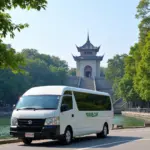Traveling to Hawaii is a dream for many, conjuring images of pristine beaches, lush rainforests, and vibrant culture. But how can you experience this paradise ethically, minimizing your impact and contributing positively to the local community? This guide provides actionable steps to ensure your Hawaiian adventure is both unforgettable and responsible.
Respecting the ‘Aina (Land) and Culture
Hawaii’s natural beauty and rich cultural heritage are deeply intertwined. Respecting the ‘aina (land) is paramount to ethical travel. Avoid disturbing natural habitats, stay on marked trails, and refrain from removing any natural souvenirs like rocks or shells. Learn a few basic Hawaiian phrases like “aloha” (hello/goodbye/love) and “mahalo” (thank you). This small effort demonstrates respect and fosters connection with the local people.
Choosing Sustainable Accommodation and Transportation
Opt for eco-friendly accommodations that prioritize sustainability practices like water conservation and renewable energy. Consider staying at locally owned hotels or guesthouses, which directly benefit the local economy. Minimize your carbon footprint by utilizing public transportation, biking, or walking whenever possible.
Supporting Local Businesses and Communities
Seek out locally owned restaurants and shops to savor authentic Hawaiian cuisine and purchase unique handcrafted souvenirs. This directly supports local businesses and helps preserve traditional crafts. Participate in cultural activities like hula lessons or lei-making workshops. These experiences offer a deeper understanding of Hawaiian culture and provide income to local artisans and instructors. Avoid purchasing items made from endangered species or coral.
Minimizing Your Environmental Impact
Bring a reusable water bottle and refill it at designated stations to reduce plastic waste. Use reef-safe sunscreen to protect marine life. Participate in beach cleanups or volunteer with local environmental organizations to give back to the community. Pack light to minimize the fuel consumption of your flights.
What Does Ethical Tourism Mean in Hawaii?
Ethical tourism in Hawaii means traveling responsibly with respect for the environment, culture, and local communities. It involves making conscious choices that minimize your negative impact and maximize your positive contribution.
How Can I Give Back to the Hawaiian Community?
Giving back to the Hawaiian community can involve volunteering with local organizations, participating in beach cleanups, or donating to reputable charities that support environmental conservation or cultural preservation. Supporting local businesses and artisans is another valuable way to contribute to the local economy.
“Ethical tourism isn’t just a trend; it’s a responsibility,” says Kumu Hula Leilani Ka’imikaua, a respected cultural practitioner in Oahu. “By embracing mindful travel practices, visitors can contribute to the preservation of our precious ‘aina and culture for generations to come.”
Is it Ethical to Visit Sacred Sites in Hawaii?
Visiting sacred sites requires utmost respect and sensitivity. Research the site’s significance beforehand and follow any guidelines or restrictions. Avoid touching or disturbing any sacred objects or areas. “Remember that these places are not just tourist attractions but hold deep spiritual meaning for the Hawaiian people,” advises Keanu Nālani, a cultural advisor on Maui. “Approach them with reverence and humility.”
Conclusion
Traveling to Hawaii ethically requires mindful planning and conscious choices. By respecting the ‘aina and culture, supporting local businesses, and minimizing your environmental impact, you can ensure a fulfilling and responsible travel experience. Embrace the spirit of aloha and contribute positively to the preservation of this beautiful archipelago. Remember, ethical travel benefits not only the local community and environment but also enhances your own travel experience.
FAQ
- What is the best time to visit Hawaii ethically? Visiting during the shoulder seasons (spring and fall) can help alleviate overcrowding during peak tourist times.
- Are there any specific cultural customs I should be aware of? Learning basic Hawaiian phrases and respecting sacred sites are essential.
- How can I support local businesses while traveling ethically? Choose locally owned accommodations, restaurants, and shops whenever possible.
- What are some eco-friendly transportation options in Hawaii? Utilize public transportation, biking, or walking.
- What can I do to minimize my environmental impact during my trip? Use reusable water bottles, reef-safe sunscreen, and participate in beach cleanups.
- Are there any ethical considerations regarding wildlife interactions in Hawaii? Maintain a safe distance from wildlife and avoid feeding them.
- How can I learn more about responsible tourism practices in Hawaii? Research online resources and consult with local organizations.
Need further assistance? Contact us at Phone Number: 0372960696, Email: TRAVELCAR[email protected] or visit us at 260 Cau Giay, Hanoi. We have a 24/7 customer support team.
Explore our other helpful articles on sustainable travel and discover exciting tour packages with our comfortable 16, 29, and 45-seater vehicles designed for ethical exploration. Check out our detailed pricing and book your journey today!
